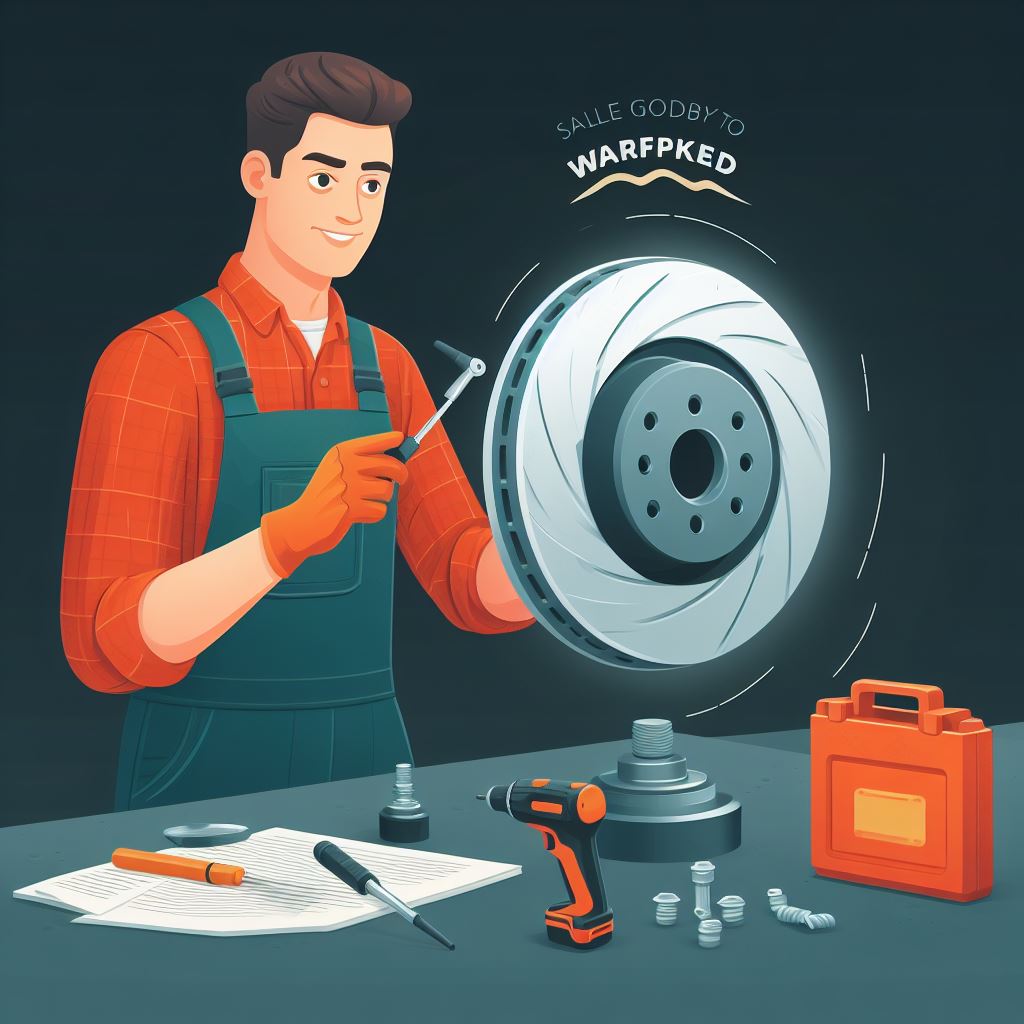In the realm of automotive maintenance, ensuring the optimal functioning of your vehicle’s braking system is paramount for both safety and performance. One common issue that drivers often encounter is warped brake rotors, a problem that not only compromises braking efficiency but can also lead to a less enjoyable driving experience.
In this guide, we will delve into valuable tips and preventive measures to bid farewell to warped rotors, empowering you to maintain a smooth and secure ride. By understanding the causes and implementing practical strategies, you can prolong the life of your brake rotors and enhance the overall well-being of your vehicle.
Key Takeaway
- Rotors can warp due to excessive heat, caused by hard braking or riding the brakes.
- Warped rotors can also be caused by improper installation, uneven wear, and rust.
- To prevent rotors from warping, avoid hard braking and riding the brakes.
Use your gears to slow down instead.
- Regularly inspect and maintain your rotors, and replace them if necessary.
- If your rotors do warp, get them replaced immediately to ensure safe driving and prevent further damage to your car.
The Basics of Rotors
It’s a question that many car owners have asked themselves, especially when they start to feel a vibration or pulsation in their brakes. The short answer is yes, rotors can warp, but let’s dive deeper into why and how it happens.
What Causes Rotors to Warp? There are a few factors that can contribute to rotor warping. The most common is heat. When you apply your brakes, the friction between the brake pads and rotors generates heat.
Over time, this heat can cause the rotors to expand and contract, which can lead to warping. Another factor is uneven tightening of lug nuts, which can put uneven pressure on the rotors and cause them to warp. How Do You Know If Your Rotors Are Warped? One of the most obvious signs of warped rotors is a pulsating or vibrating sensation when you apply your brakes.

You may also notice that your car takes longer to come to a complete stop or that it pulls to one side when braking. In some cases, you may even hear a grinding or scraping noise when you brake. Preventing Rotor Warping While it’s impossible to completely prevent rotor warping, there are some steps you can take to minimize the chances.
First, make sure your lug nuts are properly tightened and that the torque is even. Regularly inspecting your brakes and replacing worn or damaged parts can also help prevent warping. Additionally, avoid prolonged or aggressive braking, as this can generate excessive heat and increase the chances of warping.
Fixing Warped Rotors If you suspect that your rotors are warped, it’s important to have them checked by a professional mechanic. They may be able to resurface the rotors, which involves shaving off a small layer of metal to create a smooth, even surface. In some cases, the rotors may need to be replaced entirely.
do rotors warp
| Column 1 | Column 2 | Column 3 |
|---|---|---|
| Warping | The process of a rotor becoming bent or distorted, causing vibrations and uneven braking. | Warping can be caused by excessive heat, uneven pressure, or poor quality materials. |
| Rotor | The circular metal disc that is attached to the wheel of a vehicle and is responsible for slowing down or stopping the vehicle when the brakes are applied. | Rotors are typically made of cast iron or steel and can vary in size and thickness depending on the type of vehicle. |
| Braking | The action of applying pressure to the brake pedal, which in turn causes the brake pads to squeeze against the rotors and slow down the vehicle. | Effective braking is crucial for safe driving and requires well-maintained rotors that are free of warping or other damage. |
| Excessive Heat | One of the main causes of rotor warping, excessive heat can be generated during heavy braking or when the brakes are constantly applied for extended periods of time. | Excessive heat can also be caused by worn brake pads or a malfunctioning brake system. |
| Uneven Pressure | If the brake calipers are not applying equal pressure to both sides of the rotor, it can lead to uneven wear and warping. | This can be caused by a faulty brake caliper, worn brake pads, or other issues with the braking system. |
| Poor Quality Materials | If the rotors are made from low-quality materials or are not properly manufactured, they may be more susceptible to warping and other forms of damage. | It is important to use high-quality rotors from reputable manufacturers to ensure safe and reliable braking performance. |
Signs of Warped Rotors
Do Rotors Warp? The Truth Behind Rotor Warping Explained Rotors, also known as brake discs, are an essential component of your vehicle’s braking system. They work together with brake pads to slow down and stop your car. However, one common issue that many drivers face is rotor warping.
But do rotors really warp? Let’s find out. Understanding Rotor Warping First, let’s understand what rotor warping is. Rotor warping refers to the distortion or deformation of the brake disc, which can cause vibrations and uneven braking.
This can lead to a pulsating sensation when applying the brakes and even a squealing noise. The Truth Behind Rotor Warping Contrary to popular belief, rotors do not actually warp. What happens is that the brake pads leave behind a thin layer of material on the surface of the rotor, known as brake pad deposits.

These deposits can cause uneven wear on the rotor, resulting in the pulsating sensation and noise. Causes of Rotor Warping The main cause of rotor warping is excessive heat. When you apply the brakes, the friction generated can cause the rotors to heat up.
If the rotors are not able to dissipate the heat properly, it can lead to the formation of brake pad deposits. Other factors that can contribute to rotor warping include worn brake pads, heavy braking, and aggressive driving. Preventing Rotor Warping To prevent rotor warping, it is important to properly maintain your vehicle’s braking system.
This includes regular brake pad and rotor inspections, as well as replacing worn components as needed. It is also important to avoid heavy braking and aggressive driving, as these can put excessive strain on the rotors. The Bottom Line So, do rotors really warp? The answer is no.
Preventing and Fixing Warped Rotors
What Causes Rotors to Warp? One of the most common car problems is warped rotors. This occurs when the metal discs that help your car stop become unevenly worn or warped. But what causes this issue? There are a few potential culprits.
High Heat and Pressure The main reason for warped rotors is the intense heat and pressure they endure during braking. When you press on the brake pedal, the brake pads clamp down on the rotors, creating friction and heat. Over time, this constant cycle of heat and pressure can cause the rotors to warp.
Driving Habits Your driving habits can also contribute to rotor warping. Aggressive braking, such as slamming on the brakes or riding them for extended periods, can generate excessive heat and cause the rotors to warp. Poor Quality Rotors Another factor to consider is the quality of your rotors.
Cheap or low-quality rotors may not be able to withstand the heat and pressure of braking, causing them to warp more easily. Improper Installation Lastly, improper installation can also lead to warped rotors. If the rotors are not installed correctly or if they are not the right fit for your vehicle, they may not be able to handle the braking forces and can warp over time.
Preventing Warped Rotors To prevent warped rotors, it is essential to practice good driving habits and invest in quality rotors. It is also crucial to have your rotors installed correctly by a professional mechanic. Regularly checking and maintaining your brakes can also help catch any issues before they become more severe.
In conclusion, while warped rotors may seem like a common problem, there are various factors that can contribute to their warping. By understanding the causes and taking preventative measures, you can save yourself time, money, and hassle in the long run. So remember, take care of your rotors, and they will take care of you on the road.
Important Notice for readers
Attention all car owners! Have you ever experienced shaking or vibrations while braking? It could be a sign of warped rotors. Our latest article delves into the common issue of warped rotors and provides important information on how to prevent and fix it. From understanding the causes to knowing the warning signs, this article covers everything you need to know about warped rotors.
Don’t let this problem go unnoticed, as it can lead to serious safety hazards and costly repairs. Stay informed and keep your car in top condition. Read on to learn more about warped rotors and how to avoid them.
Frequently Asked Questions
What is rotor warping, and how does it occur?
Rotor warping is a common problem in vehicles where the brake rotors become distorted, leading to vibration and pulsation during braking. It occurs due to excessive heat and wear from heavy braking or driving on steep terrain.
Can rotors warp on their own or do external factors cause it?
While rotors can warp on their own due to high temperatures and wear, external factors such as aggressive driving, heavy loads, and frequent braking can also contribute to rotor warping.\n
What are the signs of warped rotors?
Some common signs of warped rotors include vibrations or pulsations felt in the brake pedal or steering wheel while braking, a wobbling sensation in the vehicle, and uneven wear on the brake pads.
How can I prevent my rotors from warping?
To prevent rotor warping, it is important to properly maintain your brakes by having them inspected and serviced regularly. Avoid heavy braking and allow your brakes to cool down after driving on steep terrain. Also, make sure your wheels are properly balanced to prevent uneven wear on the rotors.
Conclusion
As we conclude our exploration into the realm of preventing brake rotor damage, it becomes evident that a proactive approach to maintenance is the key to preserving both the performance and safety of your vehicle. By incorporating the tips outlined in this guide into your regular maintenance routine, you empower yourself to say goodbye to the inconvenience of warped rotors. Remember, a well-maintained braking system not only ensures your safety on the road but also contributes to a more enjoyable and efficient driving experience. With these insights in hand, you are now equipped to keep your brake rotors in optimal condition, allowing you to navigate the roads with confidence and peace of mind.

Leave a Reply